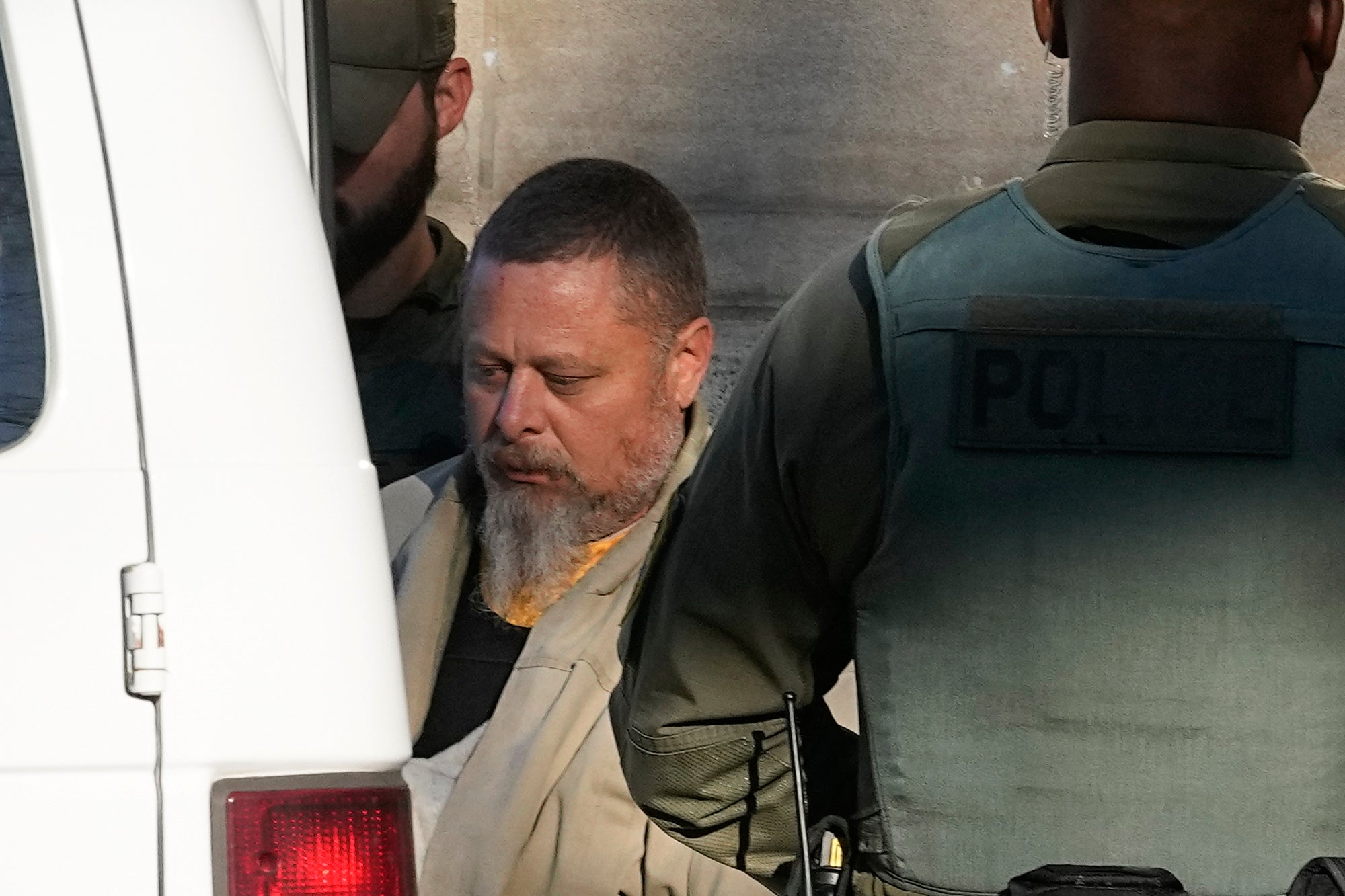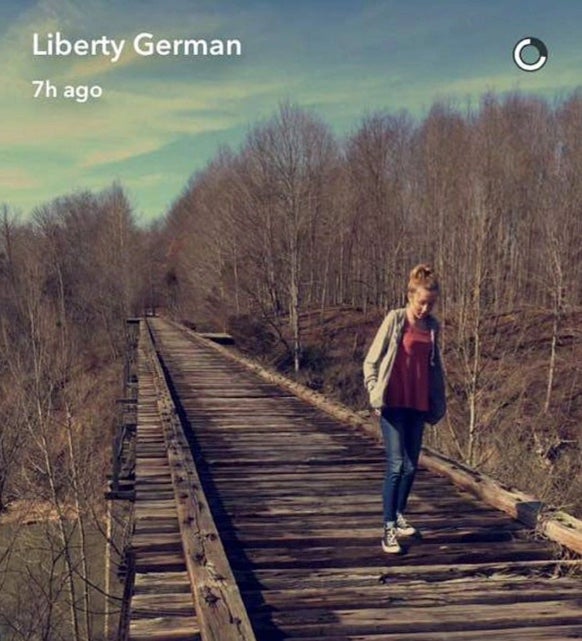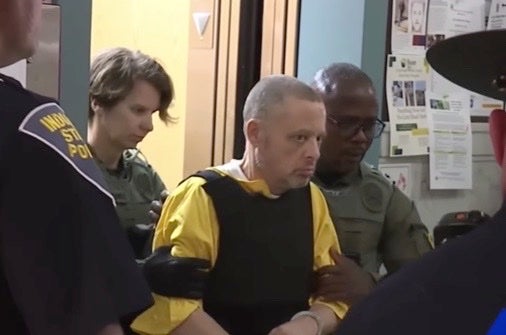Delphi murders suspect Richard Allen ‘confessed to killings multiple times’ behind bars
Richard Allen ‘confessed five or six times to killing the girls’ since his arrest in October, according to bombshell courtroom statements
Delphi murders suspect Richard Allen has confessed to the 2017 killings of teenagers Libby German and Abby Williams multiple times while behind bars, according to bombshell courtroom statements.
In an Indiana court hearing on Thursday, both the accused killer’s defence and prosecutors revealed that Mr Allen had made “incriminating admissions” about the murders in the seven months since he was arrested and jailed awaiting trial.
Carroll County Prosecutor Nick McLeland told the court the 50-year-old local Delphi man had “confessed five or six times to killing the girls”, making “multiple confessions to multiple people”.
Mr Allen’s defence attorneys agreed that Mr Allen had “made incriminating statements implicating himself in the crime,” but insisted that the statements were vague, “inconsistent” with his past not guilty plea and denials, and couldn’t be trusted due to their client’s mental state.
“Our client has made statements incriminating himself, implicating himself, in the crime,” said lawyer Bradley Rozzi.
“At one minute, Rick is saying one thing, and another minute he’s saying something else.”
The exact nature of the confessions and incriminating statements were not revealed in court.
Mr Allen’s mental state was a major part of the arguments during Thursday’s pretrial hearing where a trial date was also set for 8 to 26 January 2024.
The defence is seeking to have Mr Allen moved from a state prison, Westfield Correctional, to a county jail in Cass County, which is nearer to Delphi.
They argue that the suspect is being treated like a “dog” in the prison, and is subject to constant shackles on his hands, legs, and stomach. The attorneys said his mental state has also deteriorated to the point he is having trouble participating in his own defence.
Captain Gary Lewis, who oversees Westfield, said Mr Allen is receiving adequate treatment that’s no different from any other inmate.
Meanwhile, the sheriff of Cass County, who oversees the jail where the defence has proposed moving Mr Allen to, told the court on Thursday that “we don’t want him” due to security considerations, but said the facility is prepared to house the accused murderer if given a court order, WTHR reports.

Judge Gull is expected to rule on the matter at a later date.
The judge will also rule at a later date on a defence motion seeking to throw out key ballistics evidence from the case.
In a motion filed in an Indiana court on Tuesday, Mr Allen’s attorneys asked a judge to rule certain evidence in the case inadmissible at trial.
The motion itself is sealed but online court records show that it relates to ballistics evidence.
The criminal affidavit, which was partially redacted and released in November, previously revealed that the local man was finally tied to the February 2017 murders through a bullet found at the bloody crime scene.
Ballistics confirmed that an unspent .40 caliber round found close to the bodies of the teenage victims came from Mr Allen’s Sig Sauer Model P226.
The firearm – which he owned since 2011 – was found during a search of his home last October and both he and his wife Kathy told police he was the only person with access to it, the documents state.
The bombshell document also revealed that, in Libby’s cellphone footage, one of the victims mentions the word “gun” – suggesting that their attacker was armed with a firearm and was using it to coerce the victims.
In a police interview on 13 October, Mr Allen told investigators he had “no explanation” as to how the spent bullet ended up near the bodies of the two teenage victims, the document states.
The accused killer said he had “not been on the property where the unspent round was found, that he did not know the property owner, and that he had no explanation as to why a round cycled through his firearm would be at that location,” it says. The property owner – Ron Logan – was also previously tied to the case. He died in 2020.

Mr Allen’s attorneys previously questioned the analysis of the unspent bullet in December.
The judge’s ruling on the admissibility of this evidence could play a key role in the strength of the prosecution’s case.
Mr Allen, a 50-year-old father to a daughter, is also trying to quash evidence subpoenaed from both CVS and from Westville Correctional Center.
Mr Allen has been behind bars since his arrest in October – almost six years on from the brutal murders of Libby, 14, and Abby, 13, who went out one day together and never returned.
On 13 February 2017, the two best friends set off on a hike along the Monon High Bridge Trail in their hometown of Delphi.
During the walk, Libby posted a photo of her best friend on Snapchat as they walked along the Monon High Bridge.
Minutes later, Libby captured a video of a man – known as “bridge guy” – dressed in blue jeans, a blue jacket and a cap walking along the abandoned railroad bridge. In the footage, the man tells the two girls: “Guys, down the hill.”
Later that day, the teenagers were reported missing when they failed to return to a spot where a family member was picking them up.
The next day – Valentine’s Day 2017 – their bodies were discovered in a wooded area less than half a mile off the trail along the side of Deer Creek. Their cause of death has never been released with a previously-released search warrant application only detailing that they were killed with some type of weapon and lost a lot of blood.
For more than five years, the girls’ devastated families waited for answers in the case.
Then, in late October 2022, Mr Allen – a local man who served the victims’ families in his job at the Delphi CVS store – was arrested and charged with their murders.
According to investigators, Mr Allen is the so-called “bridge guy” captured on camera by the victims.
The suspect forced the two victims down the hill and led them to the location where they were murdered, according to his probable cause affidavit.

As well as the ballistics evidence, Mr Allen was also tied to the killings after his vehicle was spotted parked close to the trail in “an odd manner” as if to “conceal the license plate”, the documents state.
Several witnesses also reported seeing a “creepy” man matching the description of “bridge guy” around the time of the murders while one person said they saw a “muddy and bloody” man leaving the trail around two hours after Libby and Abby were last seen alive. The witnesses did not see anyone other than “bridge guy” on the trail at the time, the affidavit reads.
The married father to a daughter had been on law enforcement’s radar back in 2017 after he admitted to being on the trail the day the girls were killed.
During a 2017 interview with police, Mr Allen confessed to being on the Monon High Bridge Trail that afternoon but denied any involvement in the murders and insisted he had never seen the two girls that day.
Despite placing himself at the scene of the crime at the time of the murders, he slipped through the net due to a “clerical error”.
The sudden arrest of the local man almost six years on from the murders marked a major break in the case.
But the investigation is far from over with officials saying that they believe Mr Allen may not be the sole person involved in the killings.
Prior to Mr Allen’s arrest, investigators had been searching for information about a catfishing account which was in contact with Libby on the day she was killed.
The man behind the account – Kegan Anthony Kline – was tied to the 2017 murders in December 2021 when investigators urged the public to come forward with information about a bogus online profile named @anthony_shots.
Kline, 28, confessed to using the fake profile to groom underage girls, get them to send him nude photos and their addresses, and try to get them to meet him in person.

In a 2020 police interview, a transcript of which has been seen by The Independent, Kline admitted that he had communicated with 14-year-old Libby on Instagram and Snapchat through the catfishing profile before she died.
The transcript revealed that he had exchanged photos with the teenage girl and that Libby had communicated with the fake profile on the very day that she and Abby were murdered.
On 25 February 2017 - less than two weeks after the two girls were brutally killed – police carried out a search of Kline’s home in Peru.
Kline has never been charged in connection to the murders.
However, he has been behind bars for the last two years on a string of child sexual abuse and child exploitation felonies.
In March, he pleaded guilty to all 25 counts against him.
He then fired his attorney and said he planned to withdraw his guilty plea – before walking this back again. He is awaiting sentencing in July.
Last month, he told “The Murder Sheet” podcast in a jailhouse interview that he has information about the murders but that police “don’t want to hear anything I have to say”.



